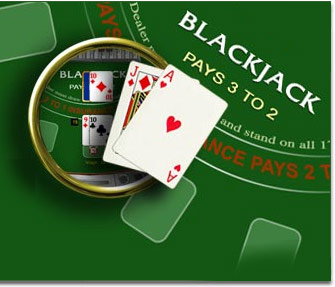Blackjack Glossary
Blackjack Terms and Definitions - A Blackjack Dictionary
This page offers definitions of various blackjack related terms. It's meant to eventually become a complete dictionary or glossary of blackjack phrases, and will gradually grow larger over time as we add more words and definitions below.
Feedback - A - B - C - D - E - F - G - H - I - J - K - L - M - N - O - P - Q - R - S - T - U - V - W - XYZ
A
- A-J Bonus
-
A popular variant rule where a bonus payout for the ace and jack of spades is offered.
- Ace adjustment
-
Changing the size of one's bet based on how many aces are left in the deck.
- Ace five count
-
A simple card counting strategy that only counts aces and fives.
- Ace side count
-
A count of how many aces have been played. This count is a "side count" because it's kept separately from the main count.
- Ace neutral count
-
Any card counting system that doesn't track aces. i.e. Aces count as 0 or null in the count.
- Ace poor
-
A situation where the deck has fewer aces left in it than is statistically likely. A deck that's poor in aces.
- Ace rich
-
A situation where the deck has more aces left in it than is statistically likely. A deck that's rich in aces.
- Action
-
The amount of money that's been bet. Can refer to an aggregate of the total amounts of bets made over a certain period of time, or it can refer to the amount in play on a particular wager.
- Advantage
-
The statistically theoretical edge one side has over the other, usually expressed as a percentage of the wager. Usually the casino has the advantage, but card counting can give the player the advantage.
- Advantage player
-
A gambler who uses strategy to gain a mathematical advantage over the casino.
B
- Back counting
-
Counting cards from behind the table as a spectator. Counting cards in blackjack when you're not playing in the game.
- Balanced count
-
A card counting system that has an equal number of cards valued at + and -. The sum of a count of all cards in a deck in a balanced count is always 0.
- Bankroll
-
The amount of funds available for wagering. Sometimes refers to the total amount of money available to gamble with, but can also refer to the amount available in a given playing session.
- Bar
-
To ban a player from playing at a casino. This term is almost always used to refer to blackjack card counters.
- Basic strategy
-
The optimum playing strategy for blackjack when not counting.
- Bet spread
-
The amount of the maximum and minimum bets a player is making during a blackjack playing session. A 1-5 bet spread means that the player is betting a minimum of 1 unit per hand and a maximum of 5 units per hand.
- Betting efficiency
-
How well a card counting system can take advantage of the theoretical advantage offered by that system.
- Big player
-
A member of a card counting team who makes a big bet when the count is favorable.
- Black chip
-
A casino chip worth $100.
- Blackjack
-
Refers to the game of 21, but also refers to a natural total of 21 on the first two cards. A blackjack always consists of an ace and a face card or a ten. Blackjack usually pays better than even odds. The most common payoff on a blackjack is 3 to 2, but some single deck blackjack games have a 6 to 5 payout. And sometimes you'll get lucky and find a casino offering 2 to 1 payouts on blackjacks. A blackjack is also called a "natural".
- Burn card
-
The first card of a new deck after the shuffle and cut. The card is discarded and placed on the bottom of the deck.
- Bust
-
To get a total greater than 21. Automatically a loss.
C
- Cage
-
Where the casino cashier is located.
- Camouflage
-
Any strategy meant to cover up card counting.
- Card counting
-
A strategy for getting the edge at blackjack by tracking the ratio of high cards to low cards that have already been played. A card counter raises his bet when the deck offers favorable odds to the player, and lowers his bet when the deck offers less-than-favorable odds to the player. There are multiple card counting systems with varying degrees of efficiency.
- Cold deck
-
Refers to a deck with a bad ratio of cards for the player.
- Color up
-
To exchange lower denomination chips for higher denomination chips.
- Comp
-
Free food, room, beverage, and travel offered by casinos to encourage big players to gamble more.
- Cut card
-
A plastic card used to cut the deck after shuffling. The dealer reshuffles the deck after reaching the cut card when dealing hands.
D
- Dealing seconds
-
A dealer cheating method. The dealer deals the 2nd card from the top if the top card would help the player.
- Deck penetration
-
The percentage of cards played out of a deck or a shoe before reshuffling.
- Discards
-
The cards that have already been played and thrown away.
- Double deck
-
Blackjack played out of two decks which are shuffled together. (As opposed to single deck, four deck, six deck, eight deck, etc.)
- Double down
-
To double the initial bet and take one and exactly one more card. Usually doubling down is only allowed after the first two cards are dealt. Some casinos allow doubling after splitting and some don't. Some casinos only allowing doubling down when the first two cards total 10 or 11.
- Double exposure
-
A blackjack variant where both of the dealer's cards are played face up. Usually players lose all pushes and blackjack pays even money in this variant.
- Downtown Vegas
-
The older area of Vegas. The casinos in Downtown Vegas generally offer better rules for the player, and the phrase is used to refer to blackjack games with those beneficial rules.
- Draw
-
Same as to hit. Taking additional cards in an attempt to get closer to a total of 21.
- Drop
-
The total wagered in a casino.
E
- Early surrender
-
Giving up on the first two cards before the dealer checks his hole card for an ace. The player only loses 50% of his wager in this situation.
- Edge
-
Expresses the percentage advantage the player or casino has in a given situation.
- Even money
-
A bet that pays off at the same amount it would lose. e.g., betting $5 to potentially win $5 is an even money bet.
- Expectation
-
Usually expressed as a percentage, refers to the amount a player can expect to win or lose, statistically.
- Eye in the sky
-
The video camera above the casino floor which is used to watch the dealers and players to catch cheating.
F
- Face cards
-
The jack, queen, and king. They're each worth 10 points.
- False shuffle
-
A dealer cheating method which doesn't really randomize the deck of cards.
- First base
-
The position of the player at the blackjack table who gets his cards first. If you're standing behind the table, the player at the far right is in first base.
- Flat betting
-
To bet the same amount on every hand.
- Fluctuation
-
The deviations from expectation in a player's bankroll.
G
- Griffin Book
-
A book of suspected card counters and casino cheaters provided to casinos by Griffin Investigations.
- Griffin Investigations
-
A private investigator corporation which specializes in casino cheating and card counters.
H
- Hard hand
-
Any hand without an ace. Also any hand with an ace where the ace must be counted as a 1 to avoid busting.
- Hard total
-
The total of a hard hand.
- Heads up
-
Playing alone against a dealer.
- Heat
-
Pressure and intimidation used by a casino to discourage card counters.
- Hi-lo count
-
A card counting system. 2 through 6 counts +1 and faces and aces count as -1.
- Hi-opt I
-
A card counting system promoted in The World's Greatest Blackjack Book. 3-6 count as +1, and tens (including faces) count as -1.
- High roller
-
Also known as a "whale". Someone who bets a lot of money.
- Hit
-
To take another card.
- Hole card
-
The dealer's face down card.
- Hot deck
-
A deck where the player has an edge or favorable situation.
- House edge
-
The percentage advantage the casino has over the player on a particular bet.
I
- Index number
-
The total count that warrants a deviation from basic strategy.
- Insurance
-
A side bet that the dealer has a blackjack. The maximum insurance bet is half of your original wager. Insurance is almost always a negative expectation bet.
J
- Junket
-
A casino subsidized travel package for a group of gamblers.
K
- Kelly betting
-
Betting a percentage of your bankroll equal to your percentage advantage. This is the optimal bet size.
- Knock out count
-
An unbalanced card counting system promoted by Olaf Vancura and Ken Fuchs. 2-7 count as +1 and aces and tens count as -1. The count does not start at 0 but starts at a number determined by the number of decks in play. Also known as the "KO count".
L
- Las Vegas strip rules
-
The rules most commonly used on the Las Vegas strip, as opposed to Downtown Las Vegas. These rules are generally less favorable to the player and use more decks.
- Late surrender
-
An optional rule where the player can surrender after seeing the dealer's hole card.
- Level
-
The number of values used in a card counting system. A level one counting system only uses +1 and -1, but a level two system would use +1, +2, -1 and -2, and so on. The higher the level, the harder the system is to use in practice.
M
- Mechanic
-
Someone who uses sleight-of-hand in order to cheat at cards.
- Money management
-
A system a player uses to decide how to handle his bankroll. Kelly betting is one money management system that works. Stop loss limits is a money management system that doesn't work.
- Money plays
-
A casino rule which allows players to wager actual cash instead of chips.
- Multiple deck
-
Using more than one deck in a game of blackjack. As opposed to a single deck game.
N
- Natural
-
A blackjack.
O
P
- Paint
-
A face card. (Jacks, queens, and kings.)
- Past post
-
A method of cheating where a player posts additional money to his wager after seeing the results of the hand.
- Pat hand
-
A total of 17 or more. Don't hit pat hands.
- Pit
-
The area in the casino which is surrounded by the table games.
- Pit boss
-
A casino employee in the pit who oversees the table games and the dealers.
- Playing conditions
-
The rules variations in effect at a casino. Playing conditions include whether or not a player can double down after a split, how many decks are in use, etc.
- Plus/minus
-
Another name for the Hi lo counting system.
- Point count
-
The total value of the count, positive or negative, at any given time.
- Push
-
Refers to the player and the dealer having the same total. Usually the player's bet is returned when there is a push.
Q
R
- Rat holing
-
Putting chips in your pocket or purse so the casino doesn't see how much you're winning.
- Rated
-
Describes a player who's a professional. Card counters prefer NOT to be rated. Can also refer to a rating given by casino hosts based on the amount lost, in which case the rating determines what comps are awarded to the player.
- Red chip
-
$5 chip.
- Resplit
-
Splitting a second pair after receiving another pair after the initial deal. (Resplitting is often not allowed.)
- Rider bet
-
A bet made by another player on someone's hand. This bet is placed behind the original bet.
- Risk of ruin
-
The mathematical chance of losing one's entire bankroll.
- Running count
-
Same as the point count.
S
- Session
-
A period of time spent gambling.
- Shill
-
A casino employee who pretends to be a player. Shills often play at empty tables in order to attract action.
- Shoe game
-
A blackjack game dealt from a shoe. Multiple deck games are almost always shoe games, while single deck games are often dealt by hand.
- Shuffle Master
-
A company which manufactures automatic shuffling machines which constantly shuffle the blackjack decks. Shuffle Master machines generally prevent card counting, since the deck is shuffled after every hand.
- Shuffle tracking
-
An advantage play technique in blackjack where a player keeps track of where the high cards are in the deck, then cuts into the deck so that the concentration of high cards is played by the dealer.
- Side count
-
An additional count of a particular set of cards, kept in addition to the point count. Aces are often tracked in a side count.
- Soft hand
-
A hand in which an ace can be counted as an 11 or as a 1 without the hand being considered a bust.
- Soft double
-
To double down on a soft hand.
- Stand
-
To decline additional cards and keep your existing total.
- Standard deviation
-
The amount of deviation from the statistical expectation.
- Stiff hand
-
Hard hands that total between 12 and 16. Stiff hand are likely to bust when drawn to.
- Stop loss limit
-
An amount of money that a gambler is willing to lose in a situation. Once the stop loss limit is reached, the gambler stops playing that session.
- Surrender
-
Deciding not to play the hand you've been dealt. You get to keep half your bet if you surrender. Not all casinos offer surrender as an option.
T
- Team play
-
Advantage play or card counting when executed by multiple people who often share a single bankroll.
- Third base
-
The person who receives cards last in a blackjack game. If you're standing behind the players, the person in third base is the farthest to the left.
- Toke
-
Any tip to a dealer or other casino employee.
- True count
-
The running count divided by the number of decks in he shoe.
U
- Up card
-
The dealer's card that is played face up. This is the first card the dealer plays to himself.
- Unit
-
An amount of a bet.
- Unbalanced count
-
A card counting system where the number of positive cards and negative cards is not equal.
V
W
- Wonging
-
To back count and only bet when you have the edge. Named for Stanford Wong.
- Win rate
-
How much a player wins per hour.
- Whale
-
See high roller.
XYZ
- Zen count
-
A card counting system made popular by Arnold Snyder. The zen count is a level two counting system.
Feedback?
Looking for a blackjack term that we didn't define? Were any of the definitions less than you'd hoped for? Consider trying the options below:
-
Try Google Definitions by searching for "define: your keyword phrase".


 Cherry Jackpot
Cherry Jackpot

